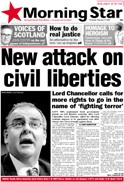 New attack on civil liberties: Lord Chancellor calls for more rights to go in the name of “fighting terror”
New attack on civil liberties: Lord Chancellor calls for more rights to go in the name of “fighting terror”
By Louise Nousratpour
Morning Star, 15 February 2007
LEFT MPs condemned fresh government attacks on civil liberties on Wednesday after Lord Chancellor Lord Falconer called for allowing criminal suspects to be questioned even after charges have been brought against them.
Critics warned that ministers were looking for a “fail-safe” plan in case fresh attempts to increase the period under which suspects can be held to 90 days failed again in Parliament.
Lord Falconer backed measures to allow police to question suspects after they have been formally charged as a “very sensible thing to do.” And he suggested that it should not be limited to terror suspects alone.
At present, police officers are not allowed to continue asking suspects about a case once charges have been made.
Speaking after a keynote speech at a Royal United Services Institute conference on politics and terrorism, Lord Falconer hinted that forthcoming terror laws will include further encroachments on civil liberties.
Campaigners and MPs warned that the proposal was designed to ensure that, if Home Secretary John Reid’s renewed attempt to extend the maximum detention period is defeated, there will be other measures to keep suspects locked up.
An attempt to increase the maximum period from 14 to 90 days led to new Labour’s defeat in the Commons in November 2005 and resulted in a 28-days compromise being reached.
Left MP Jeremy Corbyn called the proposal “a fail-safe policy in the event of Parliament rejecting the 90-day detention without trial to ensure that the government has some other draconian measure to fall back on.”
He accused the government and Lord Falconer of “trying to deny basic natural justice and to use the unfortunate development of anti-terror legislation to make them part of normal English law.
“This flies in the face of natural law and the European convention on human rights,” warned Mr Corbyn.
Labour leadership contender John McDonnell MP added: “The government is intent upon this systematic erosion of our civil liberties by procedural changes of this nature. This will inevitably result in miscarriages of justice.”
Haldane Society of Socialist Lawyers chairman Richard Harvey added that the measures were “completely unwarranted” and would lead to the further erosion of the rights of suspects in custody.
“Lord Falconer seems to be doing everything in his power to undermine this right. The Lord Chancellor’s announcement runs absolutely counter to his earlier claim that the Human Rights Act needs to be protected and supported,” he pointed out.
A Stop the War Coalition spokesman also condemned the measure as a “further attempt to undermine our civil liberties.” The spokesman stressed: ” We believe that the best way to fight terrorism is to change British foreign policy.”
But, surprisingly, civil rights group Liberty welcomed Lord Falconer’s plans as a “good alternative” to Mr Reid’s push for a 90-day detention period.
Director Shami Chakrabarti said: “Lord Falconer is right to promote human rights as the antidote to terrorism, but locking suspects up for ever longer periods without charge only breeds extremism.”
“For years, Liberty has recommended additional powers for police and prosecutors – including allowing suspects to be reinterviewed after being charged and being re-charged as further evidence is uncovered,” said Ms Chakrabarti.
The Lord Chancellor further ordered lawyers to take a back seat to policy-makers when it comes to anti-terrorism measures, implying that politicians know best. “In overcoming terrorism, policy must come first and the law second,” he crowed. “While the responses must be lawful, it is the policy-makers and not lawyers who must determine that response.”
His comments were a reference to human rights lawyers – and possibly judges – who have sometimes been blamed for frustrating government attempts to bring in new laws on terrorism.
